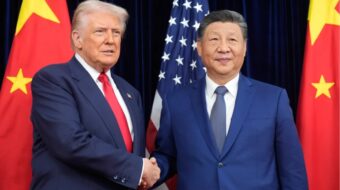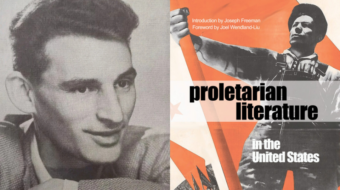The economic outcomes of 2009 for working people, one year from now, is in the hands of the acutest political struggle emerging over how exactly government should intervene in the U.S. economy to avert a depression? How much more, or what different kinds of, intervention will be required for recovery? And, what is recovery?
On one wing conservatives still intoxicated with free-market-fundamentalism, or unprepared Republican Party organizers desperate to hold on to the crumbling remains of their ‘Reagan coalition’ will, use every diversion to avert another 40 year long Democratic Party congressional supremacy, as followed the election of Franklin Delano Roosevelt, the passage of Social Security, the National Labor Relations Act, unemployment insurance, etc. Already, blatant racism and immigrant bashing within the Republican Party leadership are reflecting the desperation. Expect to hear strong demands for protectionism, racist, nativist and isolationist ideas and provocations from this group in response to the crisis.
In addition, this wing has yet to confront its numbness over finding that military might alone, or even in the main, will not meet the challenges globalization demands be solved, like inequality, development, energy, democracy, climate change, universal labor and human rights.
So far it does not appear as if any of President-elect Barack Obama’s appointees are from this wing. However, to the extent these forces are able to block, distort, waste or significantly blunt the Obama stimulus campaign they shall remain the most dangerous threat to halting the current and dramatic economic free-fall and bringing the economy under effective control and management.
Another wing — lets call them the ‘formerly-neo-liberal-now-leaning-more-liberal’ (FNLNLML) financial sector with allies throughout the real estate, insurance, manufacturing and defense sectors. Obama has several of these in his cabinet: Tim Geithner, Larry Summers, Paul Volker, and for a while – Robert Gates. On the economic side these forces represent the most powerful institutions of finance capital. They are prepared to spend as many dollars as it takes to stimulate the economy according to the advice of Keynesian economists. To varying degrees they embrace universal health coverage, liberalization of labor law, major public infrastructure and education investments, and restructuring of the financial, real estate, energy, transportation and manufacturing sectors of the economy–pretty much the commanding heights of the economy.
Yet this wing’s chief weakness in democratic reforms or nationalizations is already evident in the U.S. Treasury takeovers/bailouts of AIG and scores of banks and reborn-over-night-as-banks institutions scrambling to get a piece of the $700 billion TARP funds passed last month by Congress. That weakness is spinelessness and feebleness when it comes to actually exerting its legal power to place the public interests over private ones in the execution of its duty — which is to restore confidence, liquidity and lending at adequate rates to financial markets, effect full employment and moderate inflation.
In part this weakness is currently so pronounced because the government may have the legal authority to takeover management of the ‘too-big-to-fail’ financial institutions, but not the ability or tools with which to really perform management functions.
But the very failure to have, or even demand, the institutions and tools needed reflects class interests representing private finance capital, for whom nationalization is normally just unthinkable. This wing, for example, supports universal health care but largely shuns single-payer for fear of breaking links to the insurance industry. The health-care portion of the needed stimulus returns one of biggest ‘bangs for the buck’ in terms of jobs and long term value of all fiscal stimulus alternatives. Without single-payer, however, universal coverage may simply cost too much.
The price paid for AIG alone would put us half way to a full single-payer national health care system, based on Canadian costs with no offset for any added economies of scale. A few months of Iraq funding can pay for the program completely. From an institutional restructuring point of view, universal single-payer health care is perhaps the easiest of the giant steps needed toward real recovery. Extend the Medicare infrastructure on a national scale and you are almost there. Yet, as in health care, at every critical turn in economic restructuring this coming year, FNLNLMLs will waver, and, left to their mercies, we shall fail to get health care for all and likely fail to halt the crash for lack of a clear class interest, courage and heart.
The third wing are the millions of ordinary working people, notably organized labor, retirees, professionals, small business, the large majorities of African American, Latino, Asian, women and youth that became mobilized and activated in the grassroots campaigns of the election season — especially the Obama campaign. This is the wing, the only one, that can remain consistent and insure the stimulus, revitalization and recovery promises of the Obama campaign can become real. This is the wing that understands stupid when it sees a failed car company management being bailed out for (now) over $20 billion, when the government could have bought the company for $3 billion. This is the wing that must go to war with corporate and defense lobbying corruptions that left to their own half-hearted beneficence will divert a lion’s share of the stimulus support into futile and self-serving kickbacks.
Let’s be straightforward in defining exactly how to determine if the stimulus program is successful: A) when full employment is restored; and B) when universal health coverage is enacted. Both are eminently doable, but both will require ‘a new birth of freedom’ of association and mobilization by working people of the United States, and effective public instruments serving their will — to fufill all the social and economic tasks subordinate to this historic effort.
It’s either going to be a breakthrough year for the people’s movements and organizations, or its going to be very bad.










